Upheaval in Bangladesh could jeopardize LGBTQ rights
Colin Stewart is a 45-year journalism veteran living in Southern…
Conservative Islamist parties gain clout in transitional regime

The current turmoil in Bangladesh threatens to undo recent modest advances in LGBTQ rights there. This is a question-and-answer session with Shahanur Islam, founder and president of the LGBTQ advocacy group Justice Makers Bangladesh in France (JMBF), where he is currently located for his safety:
What has occurred in Bangladesh this summer?
Bangladesh is currently facing a significant political crisis following the ouster of Prime Minister Sheikh Hasina in early August 2024. Her resignation came after weeks of intense protests, primarily led by students demanding reform of the quota system in government jobs, who opposed her increasingly authoritarian rule. Approximately 700 people—including student protesters, journalists, members of law enforcement, and individuals associated with the then-ruling Bangladesh Awami League (AL) and its affiliated wings—have tragically lost their lives in this wave of violence.
The unrest began when members of the Bangladesh Chhatra League attacked peaceful participants in the Anti-Discriminatory Student Movement. Law enforcement agencies exacerbated the situation by opening fire on the protesters. Following Prime Minister Sheikh Hasina’s escape on August 5, the violence escalated into widespread chaos, including looting, arson, and targeted attacks on religious minorities and members of the former ruling party.
Hindus and other minority communities have been particularly vulnerable, suffering from horrific acts, including killings, rapes, and the destruction of temples, homes, and businesses. Additionally, there have been reports of revenge killings targeting members of the former ruling party, the Bangladesh Awami League, and police officers.
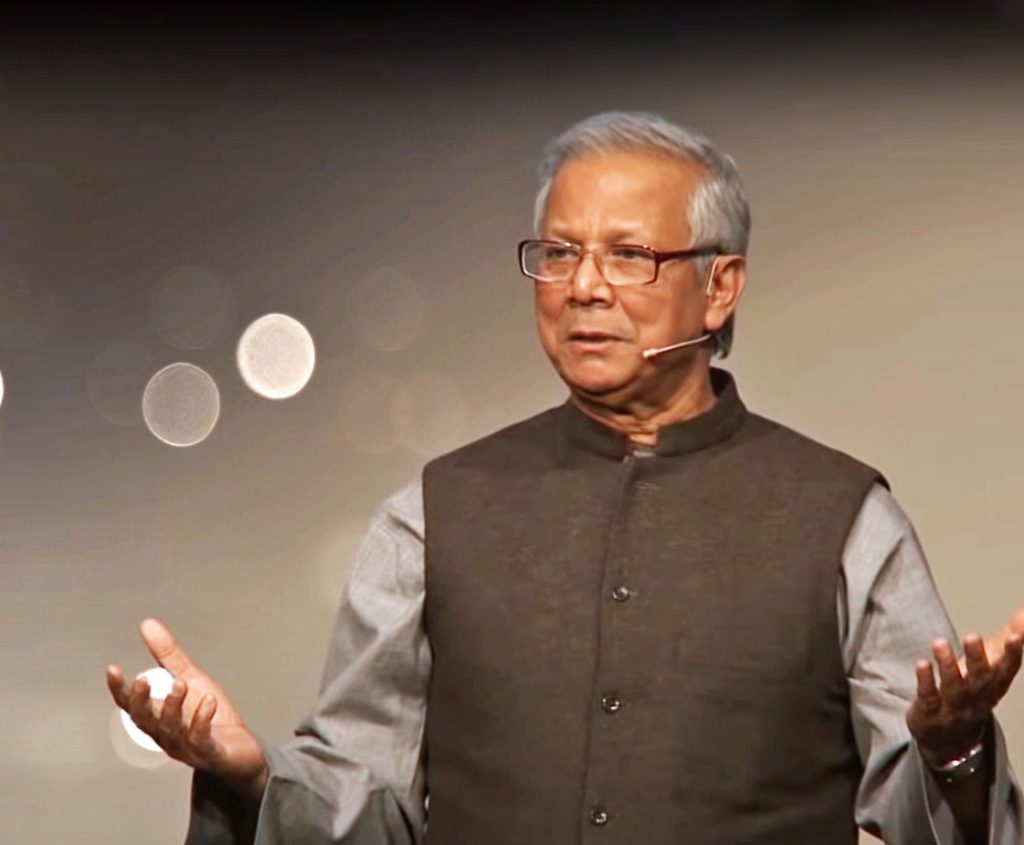
The country is now under an interim government led by Professor Dr. Muhammad Yunus, which includes leaders from some Islamic political parties and their supporters, tasked with organizing a political transition. However, the situation remains tense, with widespread demands for justice, reform, and accountability.
Leaders of the Bangladesh Awami League and its affiliated wings, along with their allies, are being implicated in politically motivated cases, facing arrests, and encountering obstacles in legal representation during court proceedings. There are also reports of physical torture by pro-BNP-Jamaat lawyers and supporters. The country is witnessing widespread mob justice, with military personnel openly torturing Awami League leaders and supporters.
Widespread vandalism, destruction, and desecration of cultural and historical monuments across Bangladesh, targeting approximately 1,500 sculptures, murals, and monuments —including those dedicated to the Father of the Nation, Bangabandhu Sheikh Mujibur Rahman, and other symbols of the liberation struggle — represent a direct assault on the nation’s cultural heritage, history, and identity.
The government has released Islamic leaders and supporters from custody, including Asif Mahtab, who has been vocal against the transgender community in Bangladesh. The interim government is perceived to have strong ties with Islamic religious parties, including Jamaat-e-Islami, Hefazat-e-Islam, Islami Andolon, and other extreme right-wing groups, and appears to be patronizing them. [Editor’s note: The interim government today lifted a ban on the Jamaat-e-Islami party that had been imposed by the Hasina regime. The Interior Ministry said the party had not been involved in terrorism.]
The military is playing a crucial role in managing the transition, but the path forward is uncertain, with the risk of continued instability. Economic challenges, social divisions, and the need for significant institutional reform are central issues that Bangladesh must address during this turbulent period.
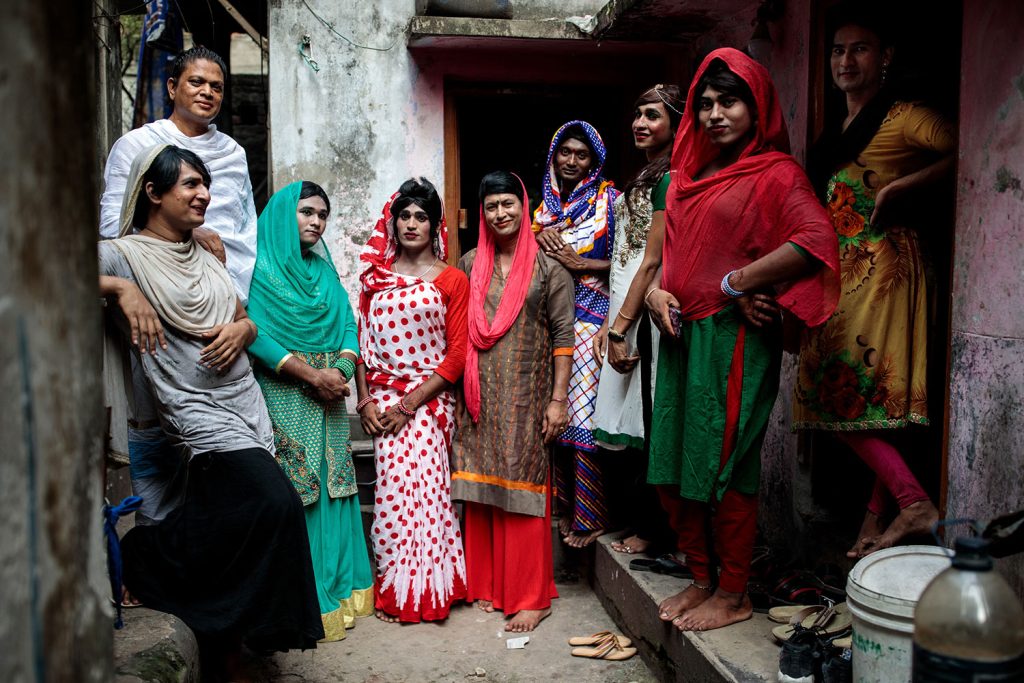
How have Bangladeshi hijra (third gender) and LGBTQ communities been affected?
The hijra and broader LGBTQ+ communities in Bangladesh have been severely impacted by the ongoing political crisis and ensuing violence. The rise of extremist groups and the interim government’s alignment with Islamic political parties, known for their conservative and anti-LGBTQ+ stances, have exacerbated the challenges faced by these communities.
Some members of the hijra community, who often rely on small businesses for their livelihoods, have faced targeted attacks. Shops and stalls run by hijra individuals were vandalized and forcibly removed from public spaces, such as footpaths, further marginalizing them economically. One prominent figure, Mrs. Anowara Begum, a transgender woman who contested the last parliamentary election, received death threats and demands for extortion through a letter left at her door after the fall of the previous government.
As religious and right-wing extremist groups gain influence, the hijra and LGBTQ+ communities are increasingly worried about the risk of physical assaults, harassment, and even killings. The societal stigma against these communities has intensified due to the growing influence of extremist ideologies, making them more vulnerable to discrimination and violence.
The ongoing violence, fear of persecution, and loss of community support have taken a severe toll on the mental health of LGBTQ+ individuals. Many are experiencing heightened levels of anxiety, depression, and trauma, with little access to mental health services, which were already limited before the crisis. The situation has left many in the community feeling isolated and unsafe, with few avenues for support or protection.
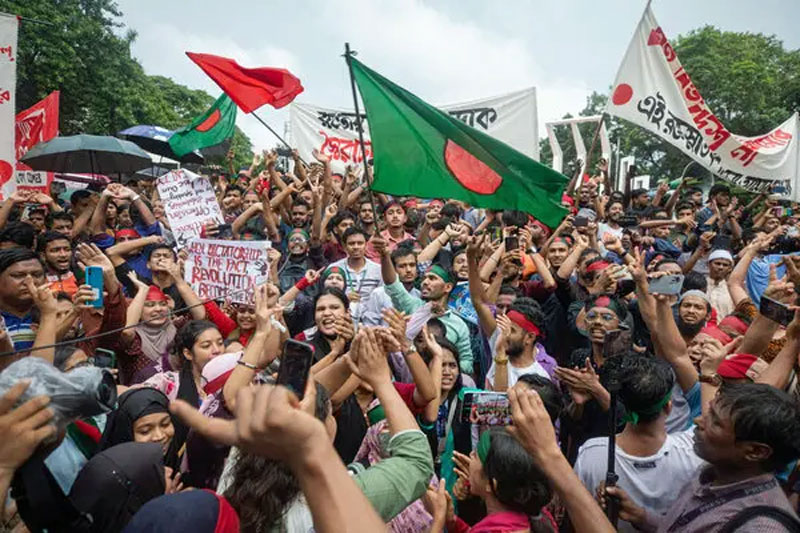
Have the hijra and LGBTQ communities been involved in the protests?
Yes, some members of the hijra and LGBTQ+ communities in Bangladesh have been involved in the protests. Their involvement has been driven by a combination of solidarity with the broader demands for justice, reform, and an end to authoritarian rule. Many in these communities have joined the protests in solidarity with wider student-led movements and other civil society groups that are calling for democratic reforms and an end to authoritarian practices.
In summary, the hijra and LGBTQ+ communities have participated in the protests, motivated by their commitment to broader democratic movements and the pursuit of justice and reform.
Are LGBTQ rights issues played a role in the summer’s protests?
LGBTQ+ rights issues have not been the focus of the summer’s protests in Bangladesh, which have been driven largely by demands for political reform and an end to authoritarian practices. However, as an LGBTQ+ rights activist, I tried to raise these issues on social media.
Unfortunately, I was victimized by various forms of bullying and harassment, including threats on social media.
Has the power of anti-LGBTQ conservative Islamists been strengthened or weakened by the summer’s protest and the departure of Sheikh Hasina?
The summer’s protests and the departure of Prime Minister Sheikh Hasina have significantly impacted the power dynamics in Bangladesh, including the increased influence of anti-LGBTQ+ conservative Islamist groups.
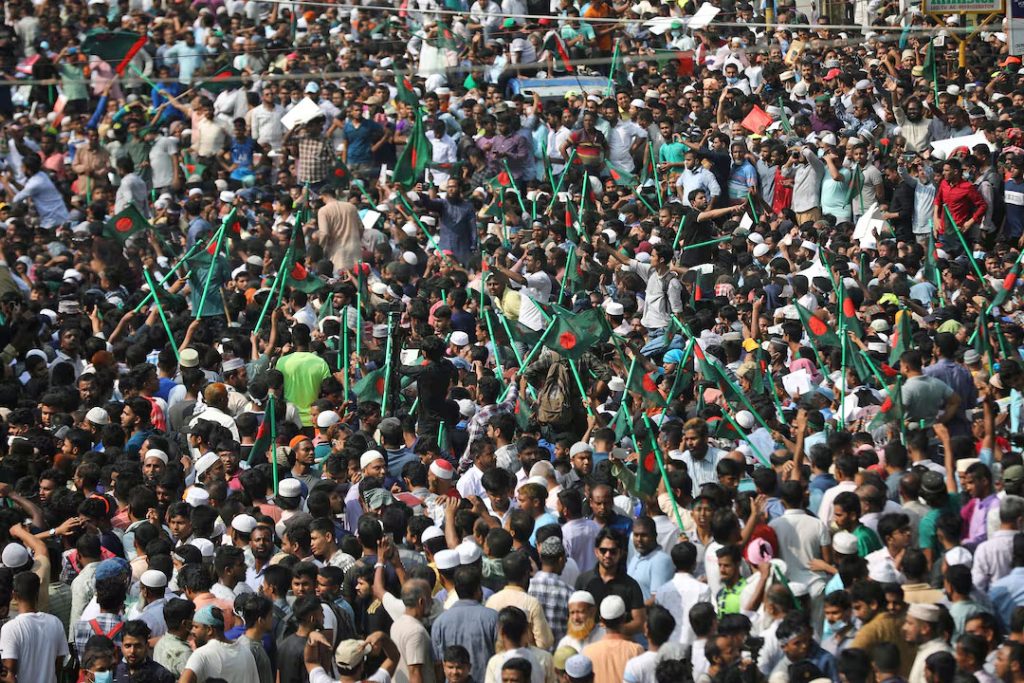
1. Increased Influence of Conservative Groups:
With Sheikh Hasina’s departure and the subsequent instability, conservative Islamist groups, including Jamaat-e-Islami, Hefajat-e-Islam Bangladesh, Islami Andolon Bangladesh, Khalafat-e-Majlish Bangladesh, and Jaker Party, which hold anti-LGBTQ+ agendas, have gained more political and social influence. The interim government’s alignment with these groups has provided them with a platform to advance their views and policies. They are already planning to establish an Islamic platform.
2. Support from the Interim Government:
The interim government, which includes leaders and supporters of Islamic political parties, has created an environment more conducive to conservative and anti-LGBTQ+ rhetoric. This political backing has empowered these groups to push their agendas more aggressively. For example, Hefajat-e-Islam Bangladesh’s K.M. Khalid is now an adviser to the interim government led by Prof. Yunus. Additionally, Farida Akter, wife of Farhad Majhar, the spiritual guru of Hefajat-e-Islam, is also an adviser to the current interim government. Moreover, Dr. Ashif Zazrul and Sayeda Rizwana Hasan, who are known to support conservative wings, are now advisers in the present government.
3. Rise in Rhetoric and Activism:
The political chaos and shifting power structures have emboldened anti-LGBTQ+ groups to intensify their activism and rhetoric. This includes increased public denunciations of LGBTQ+ rights and efforts to enforce conservative social norms. Some Islamic political leaders have even begun campaigning publicly against the transgender quota in government jobs.
4. Public Sentiment and Extremist Ideologies:
In times of political instability, there is often a rise in nationalist and conservative sentiments. Anti-LGBTQ+ ideologies gain traction in such contexts, which may heighten hostility and actions against LGBTQ+ individuals and communities.
In Summary:
The departure of Sheikh Hasina and the ensuing political instability have likely strengthened the power of anti-LGBTQ+ conservative Islamist groups in Bangladesh by providing them with increased political influence and a more favorable environment to promote their agendas. However, the overall impact on their power is complex and can be influenced by various factors, including internal conflicts, shifting political priorities, and ongoing advocacy efforts by LGBTQ+ activists.
Has the change in regime made you more or less optimistic about the prospect for LGBTQ rights in Bangladesh?
The change in regime in Bangladesh has likely impacted optimism regarding LGBTQ+ rights, and the effect can vary depending on individual perspectives and experiences. Here’s a nuanced look at how the regime change might influence optimism about LGBTQ+ rights:
Reasons for Increased Concern:
1. Rise of Conservative Groups
The increased influence of conservative Islamist groups, who often hold anti-LGBTQ+ views, can create a more hostile environment for LGBTQ+ individuals. Their heightened power and public rhetoric against LGBTQ+ rights may lead to increased discrimination, violence, and legal restrictions.
2. Support from the Interim Government
The interim government’s alignment with conservative Islamic parties could mean less focus on progressive reforms and more support for traditional, conservative values. This political shift may result in setbacks for LGBTQ+ rights and protections.
3. Public Sentiment and Activism
The rise in nationalist and conservative sentiments during times of political instability may translate into greater societal hostility toward LGBTQ+ individuals. This could result in increased social stigma and challenges in advocating for LGBTQ+ rights.
Reasons for Potential Optimism:
1. Increased Visibility
The political upheaval might present opportunities for LGBTQ+ advocates to raise visibility and push for dialogue on LGBTQ+ issues. Activists can use the platform of political transition to highlight the importance of human rights and inclusion, even in a challenging environment.
2. Global Attention:
International attention and pressure can sometimes influence domestic policies. The situation in Bangladesh may attract global advocacy and support for LGBTQ+ rights, potentially leading to increased scrutiny and advocacy from international organizations and governments.
Summary
The change in regime has introduced both challenges and potential opportunities for LGBTQ+ rights in Bangladesh. While the increased influence of conservative groups and the interim government’s support for traditional values might pose significant hurdles, there are also opportunities for raising visibility and garnering international support.
Optimism about the future of LGBTQ+ rights in Bangladesh will depend on activists’ ability to navigate these challenges, leverage global attention, and continue advocating for progress in a complex and evolving political landscape.
Does Muhammad Yunus support LGBTQ rights?
Professor Muhammad Yunus, the Nobel laureate and social entrepreneur renowned for his work in microfinance and social business, has not been a prominent advocate for LGBTQ+ rights in Bangladesh. His public efforts have primarily focused on economic development, poverty alleviation, and social business initiatives.
While Yunus has addressed various social issues related to poverty and economic development, LGBTQ+ rights have not been a central aspect of his public advocacy. Historically, he has expressed personal support for LGBTQ+ rights during his time abroad. However, this stance led to protests from Islamic groups in Bangladesh, which prompted him to refrain from making further public comments on the issue within the country.
Under the current regime, Yunus’s interim government has aligned with conservative Islamic parties that may not support LGBTQ+ rights. This political alignment could impact the policies and attitudes of the interim administration regarding LGBTQ+ issues.
There have been no recent, widely reported statements or actions by Yunus explicitly addressing LGBTQ+ rights. His silence on the matter may reflect a broader political or personal stance rather than an active opposition to LGBTQ+ advocacy.
Are the prospects for Rohingya refugees who sought refuge in Bangladesh from violence in Myanmar improved or worsened by the summer’s events?
The prospects for Rohingya refugees in Bangladesh have likely worsened due to the summer’s events, including the political upheaval and the departure of Sheikh Hasina. Here’s an overview of how these developments impact the situation:
Political Instability — Strain on Resources and Capacity:
The political instability and violence following Sheikh Hasina’s departure have strained Bangladesh’s resources and government capacity. This instability can lead to decreased attention and support for ongoing humanitarian crises, including the Rohingya refugee situation.
Shift in Government Priorities — Conservative and Nationalist Alignment:
The interim government’s alignment with conservative and nationalist groups might shift priorities away from international humanitarian obligations. There could be a reduced focus on refugee support, with domestic issues or political goals taking precedence.
Resource Allocation — Challenges in Aid and Support:
The political and economic turmoil could strain resources, potentially leading to diminished aid and support for Rohingya camps. The government may face difficulties in maintaining infrastructure and services for refugees due to the redirection of resources towards managing domestic unrest and political challenges.
Security Concerns — Tighter Security Measures:
Increased security concerns and potential internal conflicts may lead to stricter security measures around refugee camps. This could worsen the already challenging living conditions for Rohingya refugees and hinder access to essential humanitarian aid.
Rise in Anti-Refugee Sentiments — Fueling Hostility and Restrictive Policies:
The rise in nationalist and conservative sentiments might exacerbate anti-refugee rhetoric and policies. This could result in increased social stigma against Rohingya refugees and pressure on the government to adopt more restrictive measures.
Summary:
The political upheaval and subsequent instability have likely had a negative impact on the prospects for Rohingya refugees in Bangladesh. Strained resources, shifting government priorities, increased security concerns, and rising anti-refugee sentiments all contribute to a more challenging environment for the Rohingya population.
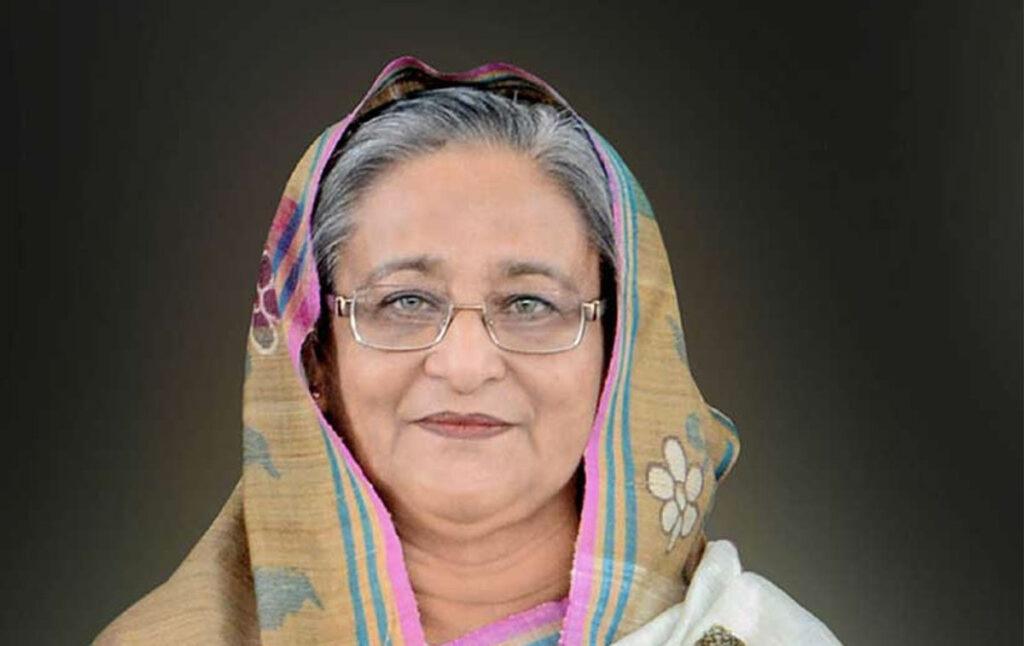
What more deserves to be said?
Context Under Sheikh Hasina’s Government:
• Human Rights Record: The previous government under Sheikh Hasina had a mixed record, with significant human rights concerns including torture, extrajudicial killings, and interference with the judiciary. Despite these issues, there were some notable initiatives aimed at improving the situation for transgender and hijra communities. Hasina’s government took steps to support these communities and showed a somewhat progressive stance on LGBTQ+ rights, even if actions were occasionally constrained by political pressures.
• Backlash and Compromises: Due to protests and pressures from conservative Islamic political groups, Hasina’s government was sometimes compelled to retreat from certain progressive decisions regarding LGBTQ+ rights. Although there were supportive moves, the political climate often forced a balancing act between progressive reforms and conservative opposition.
Current Situation with the Interim Government:
• Alignment with Conservative Groups: The interim government, which includes leaders from conservative Islamic parties and groups, has shifted the political landscape towards more conservative and nationalist ideologies. This shift raises concerns about the future of LGBTQ+ rights and the visibility of LGBTQ+ individuals.
• Increased Influence of Islamist Extremists: With the rise in influence of Islamist extremist groups and the backing of conservative parties, there is a real fear that the environment for LGBTQ+ individuals will become more hostile. These groups are likely to push for policies that align with their conservative views, which could lead to increased restrictions on LGBTQ+ rights and greater societal stigma.
• Potential for Increased Persecution: The political shift towards conservative and extremist ideologies could result in heightened danger for LGBTQ+ minorities. There is a risk that LGBTQ+ individuals may face increased persecution, violence, and social invisibility. The alignment of the interim government with these groups suggests that LGBTQ+ rights may become less of a priority and more vulnerable to attack.
Summary:
The transition from Sheikh Hasina’s government to the current interim administration has significantly impacted the landscape for LGBTQ+ rights in Bangladesh. While Hasina’s government, despite its human rights abuses, made some efforts to support LGBTQ+ and hijra communities, the new interim government’s alignment with conservative and Islamist groups poses a serious threat to these gains. There is increasing anxiety that the influence of conservative and extremist elements will lead to greater risks for LGBTQ+ individuals, resulting in a more dangerous and oppressive environment.





This report is not true, full of flawed information. I saw people from LGBTQ in the movement fighting against Fascist Sheikh Hasina.
Thank you for sharing your perspective. It is indeed important to acknowledge and celebrate the diversity of voices in any movement, and I fully recognize the participation of members of the LGBTQ+ community during the July Uprising.
However, based on my observations, no one raised LGBTQ+ issues as a central focus during the uprising. My question to you is this: where did you see the claim that LGBTQ+ individuals did not participate in the movement? This article didn’t deny their participation but highlighted that LGBTQ+ issues were not a focal point during the July Uprising.
However, as an LGBTQ+ rights activist, I tried to raise these issues on social media. Unfortunately, I was victimized by various forms of bullying and harassment, including threats on social media.
It seems there may have been some misunderstanding. Either you did not read the full article or perhaps misinterpreted the argument being made. If you have specific examples or insights illustrating that LGBTQ+ issues were actively emphasized during the uprising (rather than just participation by LGBTQ+ individuals), sharing them would enrich this dialogue and provide valuable context for everyone.
Thank you again for bringing up this important point.